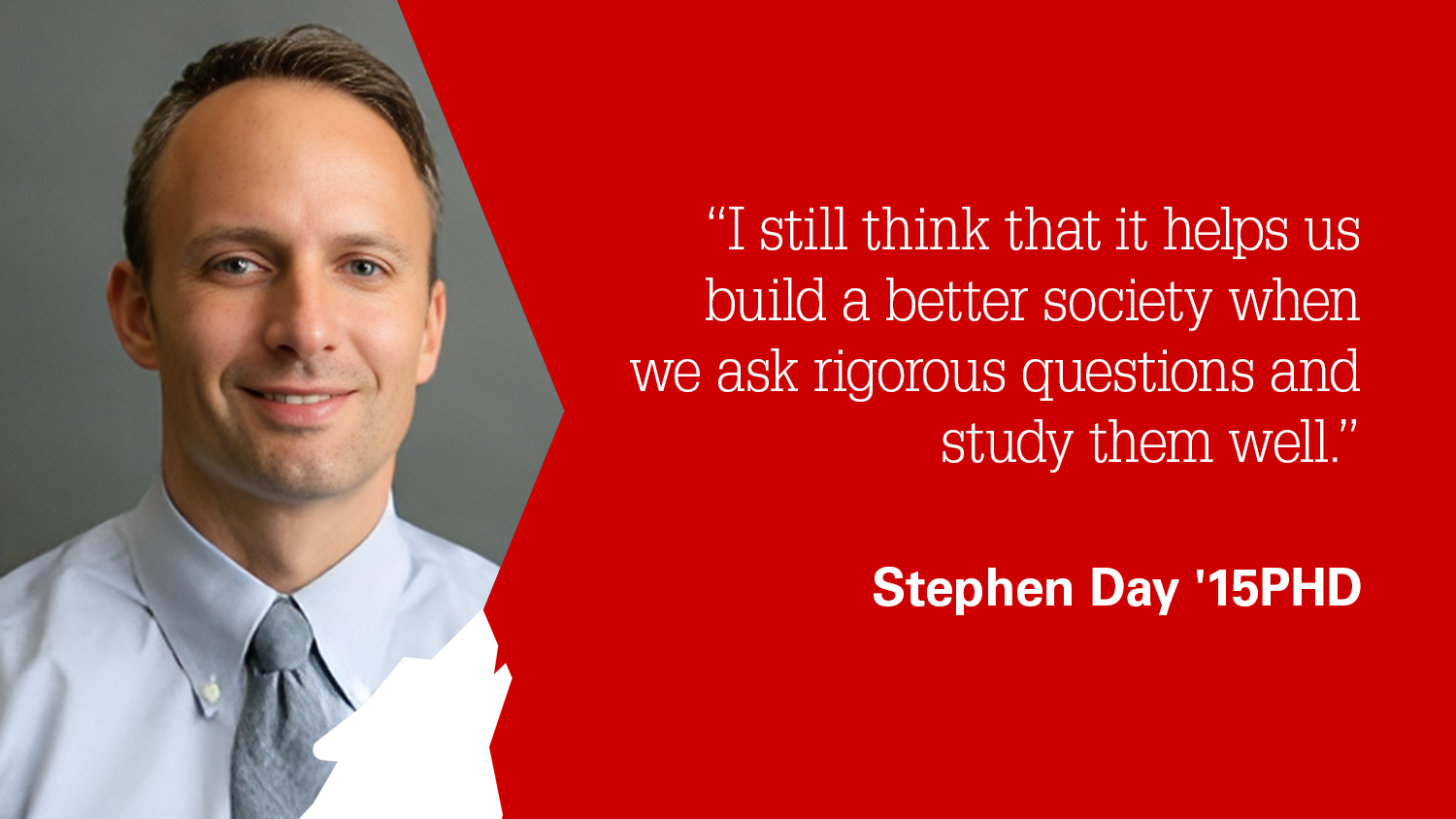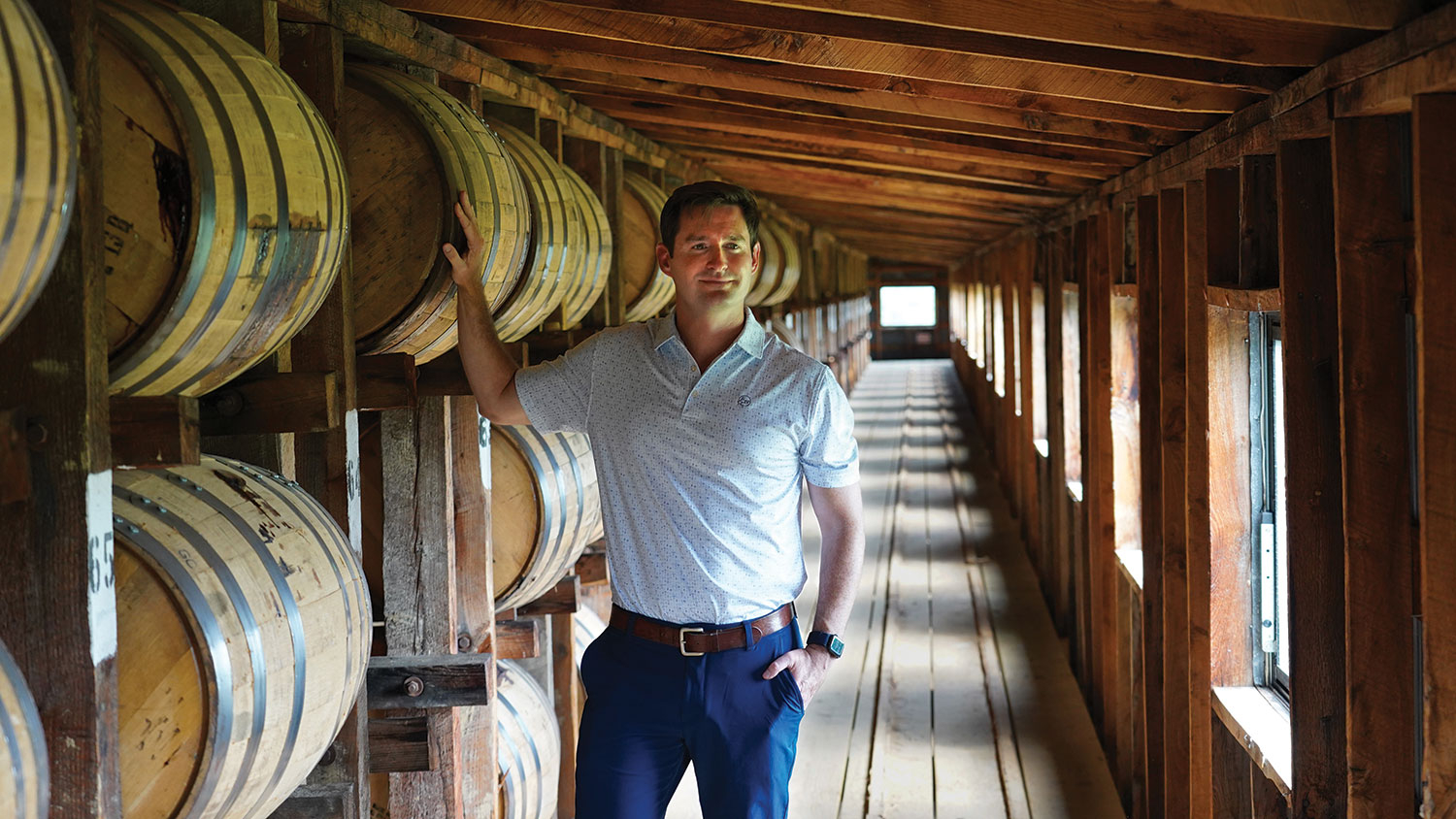WhyIChoseEducation: ‘I Still Think That It Helps Us Build a Better Society When We Ask Rigorous Questions and Study Them Well,’ Says Stephen Day ’15PHD

In the home of Stephen Day ’15PHD, there is a bustling mini-economy. When his kids complete chores, they earn “Day Bucks,” which can be used at the family store to purchase small toys from the Dollar Tree or coupons for tasks parents might be tired of doing, like printing out yet another coloring page of a saber-toothed tiger.
Day’s children also vote on taxes, tithe to their church and create small businesses of their own. The purpose is not simply to create a system for managing chores, but rather to provide an opportunity to learn lessons about the ways in which money and work are linked to goals and values.
“It’s supposed to create this ecosystem where kids experience an economic life and how every part of that interconnects,” said Day, a term associate professor at Virginia Commonwealth University and director of its Center for Economic Education. “They’re not just learning rules or being managed. They’re experiencing and practicing what it means to be an economic thinker.”
Day’s passion for helping kids better understand economics has been consistent throughout his career. For eight years, he was a high school social studies teacher and then served as program director for the North Carolina Council on Economic Education while earning his doctoral degree in the NC State College of Education’s Ph.D. in Teacher Education and Learning Sciences social studies education concentration.
Following the completion of his dissertation, entitled “How Elementary Teachers Use Classroom Mini-Economies When Guided by the C3 Framework,” Day became the director of Virginia Commonwealth University’s Center for Economics Education, where he now instructs teachers on how to better teach economics.
“A Center for Economic Education views economic literacy, for grades kindergarten through 12th grade, as a really important public good, and we seek to advocate that by all the different programs that we do,” Day said.
To reach an even wider audience, Day has also created a blog, entitled Paper Robots, where he draws on his academic and personal experiences to help parents and kids talk about money, life and work.
The blog, Day said, has given him an opportunity to write more creatively. Over the past few months, his posts have included a deeper look at family economics in the popular children’s TV show “Bluey,” why chores are less common than they were in the past and the importance of supporting internal motivation.
“I’m applying to family life what I’ve learned in my school life, and I love it,” Day said.
Why I Chose Education:
I chose education when I was 18 years old and trying to decide on a college major. I liked history, economics and government, and so I thought if I got an education degree, then I could also be a teacher. That’s exactly what I did, and that’s actually what I’m still doing. I still love the social studies content. I still love the questions it asks, and I still think that it helps us build a better society when we ask rigorous questions and study them well.
How Education Shaped Me:
When I am thinking through an issue, or some new bit of information I have, I automatically think about how I would teach it to students or how I would write it down in a research paper.
I first noticed this habit of the mind when I left the classroom. Between teaching high school and teaching classes at NC State, I wasn’t teaching anybody. I just felt like there was this gap in my brain. I remember I was reading this history book, and I thought, “Oh, this is really fascinating stuff. I love this. How am I going to teach this to my students?” And then there was this sinking, feeling of “Oh my gosh, I don’t have any students anymore.”
It sort of made me sad. Other people don’t have this opportunity. They can’t share the things that they learn in their classrooms. Education has definitely changed how I think; I think about things by teaching.
Why Economics Education Matters:
Economics is the study of how people make choices. If you’re really trying to look at why people make the choices that they do, and how the dynamics of a changing environment affect people’s choices, you need strong economics to do that.
I don’t think that we do a good job in our personal lives of really defining what we’re after. When you start saying what you’re willing to give up in order to reach a goal, that’s when it defines it much more crisply. That’s what economics is. It’s throwing your goals into sharp relief by saying what you’d be willing to give up to get them.
It also makes you a better thinker. It makes your choices more realistic by taking away the talking about things and really moving into the doing.
What I Enjoyed Most About the NC State College of Education:
The diversity of things you got to do on a given day — the range and space to think about things, the push to study things with new methods. It was really freeing to be able to do all these different projects and work with all these different people in the College of Education.
For every project, I had to gain new skills for it: qualitative research, quantitative research, better economics and social studies skills, curriculum and instruction, and then general education methods. I learned a lot of new life skills because I was transitioning into a new sector of employment as well. I had to grow in a lot of different directions at once, and I thought the program really helped me do that.
The Last Thing That Inspired Me:
My children recently inspired me with how resolute they are and how intrepid they are. My nine-year-old and his siblings wanted, for this summer, to be able to ride around the neighborhood on their bikes and get together with their friends, so they created their own bike club.
I was inspired by the vision that my 11-, nine- and seven-year-olds had in deciding what they wanted to do, finding out how to safely ride their bikes across the neighborhood, and now they’re the kings of this little bike club. There’s about two dozen kids, and they’ll get up in the morning on the weekend, and they’ll go a mile and a half riding in this peloton and building community. They’re pretty intrepid and brave, and they’ve got good heads on their shoulders, and I was inspired by their vision.
This post was originally published in College of Education News.
- Categories:


